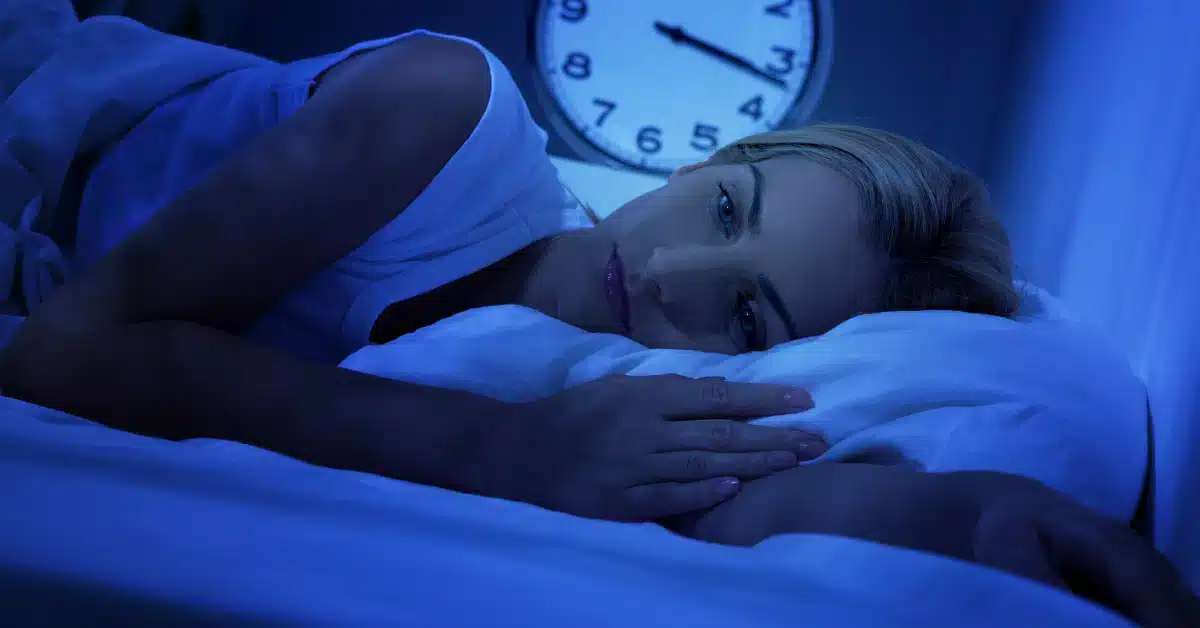Tackling PMS Insomnia: Causes, Symptoms, and Solutions for Better Sleep
Having difficulty getting a good night’s sleep during that time of the month?
It is probably a Premenstrual Syndrome (PMS) symptom, Insomnia.
Insomnia is one of the most common symptoms of PMS, with up to 30-40% of women reporting sleep disturbances in the days leading up to their period.
PMS can cause a wide range of symptoms, including Insomnia, that can make it challenging to get the rest you need.
However, there are some ways to help you sleep better and rest during your menstrual cycle.
In this article, we will look at PMS Insomnia, its causes, symptoms, and potential treatment options.
Why does PMS cause Insomnia
The exact cause of how Premenstrual Syndrome causes Insomnia is not known; however, there are several theories.
Hormonal fluctuations during the menstrual cycle can be one reason.
During the premenstrual phase, Estrogen levels drop, and Progesterone levels rise.
These changes in hormonal levels can affect one’s sleeping patterns leading to Insomnia.
Another possible cause is stress.
It is one of the common PMS symptoms women experience in the days leading up to their period.
Stress can make it more difficult to fall asleep or even stay asleep.
Some other factors that may contribute to or worsen PMS Insomnia are:
- Alcohol consumption
- Caffeine consumption
- Poor sleeping habits
- Using electronic devices before going to bed
Premenstrual Syndrome Insomnia symptoms

PMS Insomnia symptoms can vary widely among individuals.
Some common symptoms include
- Difficulty falling asleep
- Waking up frequently during the night
- Waking up too early in the morning
- Feeling tired and weak during the day
- Poor concentration
- Irritability or mood swings
- Headaches
In severe cases, PMS Insomnia can significantly impact an individual’s daily life.
How to deal with PMS Insomnia
For some women, changes due to PMS are manageable, but they can be pretty disruptive for others.
The good thing is there are several treatment options for PMS Insomnia.
Here are some strategies that may help you.
Improve sleep habits
One of the most effective ways to manage Insomnia is to improve your sleeping habits.
You can do that by establishing a regular sleep schedule, avoiding caffeine and alcohol in the evening, and creating a relaxing sleep environment.
It is important to avoid using digital devices before sleep, as the blue light emitted by these devices can interfere with our sleep.
Reduce stress
As mentioned before, stress can affect our sleeping patterns.
Reducing stress can help in managing PMS Insomnia.
You can try several relaxation techniques, such as yoga, meditation, and deep breathing.
Regular exercise can also help in reducing stress and improving sleep quality.
Medications
If changes in your sleeping habits do not help, prescription-based medicines, such as Benzodiazepines, can help manage PMS Insomnia.
There are also some over-the-counter medicines available to help with Insomnia.
However, it is important to take these medications under the guidance of your healthcare provider, as they can have side effects.
Hormonal therapy
PMS Insomnia can be caused by hormonal abnormalities that are difficult to manage.
Hormonal therapy can be an option for women experiencing severe PMS Insomnia.
Treatment may involve using birth control pills or hormonal medications to reduce PMS symptoms.
Cognitive Behavioral Therapy (CBT)

Cognitive behavioral therapy can help in managing Insomnia.
It involves talking with a therapist to identify and change negative thought patterns and behaviors that may contribute to Insomnia.
CBT can effectively improve sleep quality and reduce symptoms of depression and anxiety, responsible sleeping problems.
Takeaway
In conclusion, PMS Insomnia is a common symptom that can significantly affect a woman’s quality of life.
However, many ways exist to manage and treat PMS Insomnia, including lifestyle changes, herbal remedies, and medications.
Working with a healthcare provider to find the right treatment plan for your unique needs and situation is essential.
By prioritizing sleep and taking steps to manage PMS symptoms, you can improve your overall health and well-being during your menstrual cycle.
So, take care of yourself, and don’t let PMS Insomnia keep you up at night!
Frequently Asked Questions
Is Insomnia a part of PMS?
Yes, Insomnia can be a symptom of Premenstrual Syndrome (PMS). The symptoms of PMS Insomnia can include difficulty falling or staying asleep, waking up frequently during the night, and feeling tired or exhausted during the day.
Can PMS cause anxiety and Insomnia?
Yes, PMS can cause anxiety and Insomnia. Hormonal fluctuations during the menstrual cycle may affect sleep patterns and mood, leading to increased stress and anxiety. Insomnia is also a common symptom of PMS, and chronic Insomnia can increase the risk of developing anxiety and other mental health conditions.
What medication is used for PMS Insomnia?
Several medications can be used for PMS Insomnia, including over-the-counter sleep aids, prescription sleep medications, and antidepressants. Consult with a healthcare provider before taking any medication, as they can have side effects and interactions with other medicines. Non-pharmacological treatments may also be effective.
What herbal remedies are good for PMS Insomnia?
Herbal remedies like chamomile, valerian root, passionflower, and lavender may help improve sleep and reduce PMS Insomnia symptoms. However, scientific evidence supporting their effectiveness is limited, and they can have side effects and interact with other medications. Consult with a healthcare provider before using any herbal remedies for PMS Insomnia.
Why PMS gives you Insomnia?
PMS can cause Insomnia due to hormonal fluctuations during the menstrual cycle, disrupting sleep patterns and increasing stress and anxiety. Other factors like caffeine and alcohol consumption, poor sleep habits, and underlying mental health conditions can also contribute to PMS Insomnia.
WowRx uses only high-quality sources while writing our articles. Please read our content information policy to know more about how we keep our content reliable and trustworthy.






